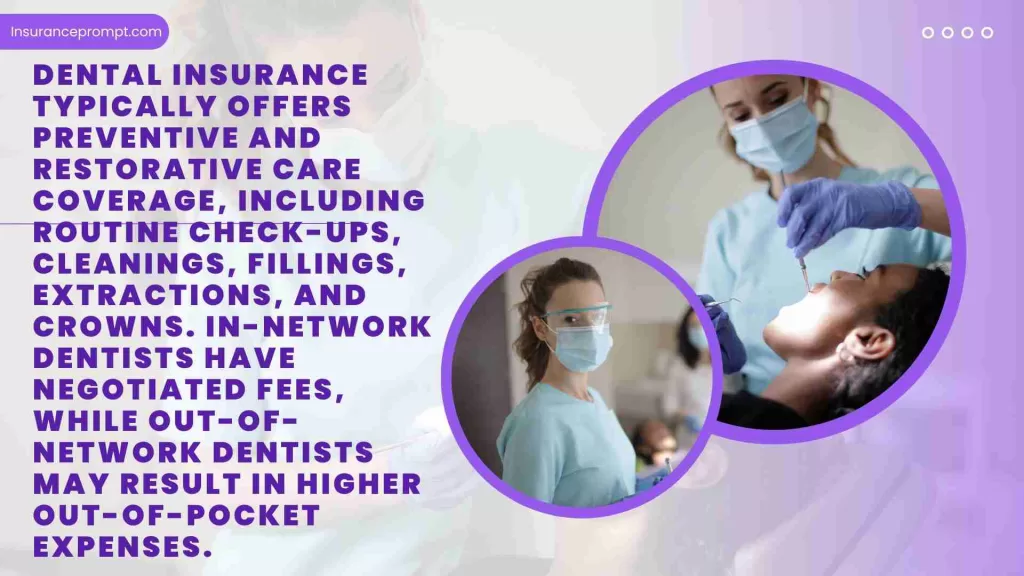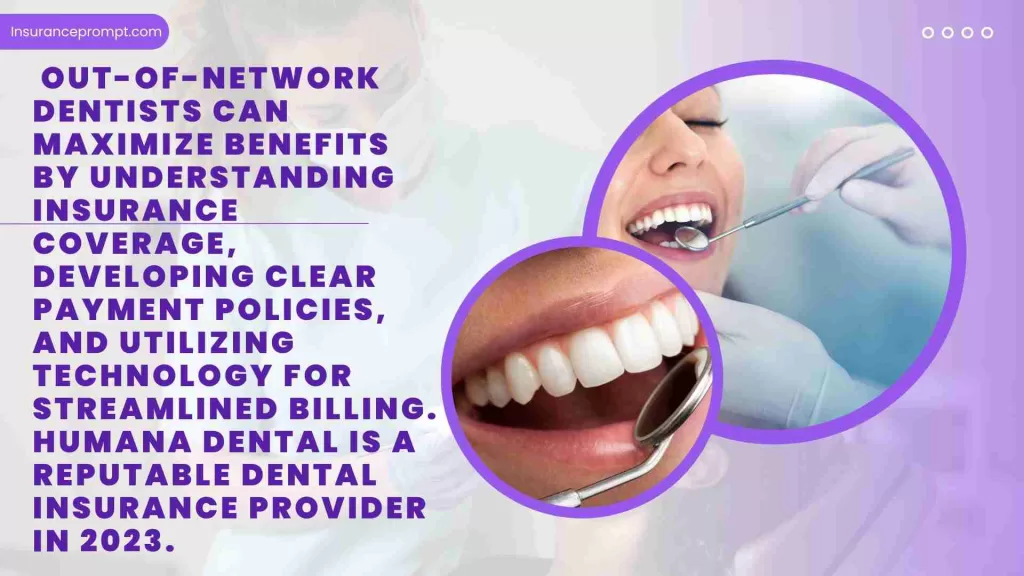Introduction
Navigating the world of dental insurance can be complex and confusing, especially when trying to find coverage for out-of-network dentists. In 2024, new updates and regulations have been introduced that may impact your dental care options.
As a savvy consumer seeking the best dental insurance plan for your needs or an out-of-network dentist looking to maximize your benefits, staying informed on these changes is crucial.
In this blog post, we’ll explore the ins and outs of dental insurance for out-of-network providers, weigh the pros and cons, uncover common misconceptions, and reveal valuable information to help you make informed choices in 2024.
Key Takeaways
- Dental insurance covers the cost of preventive and restorative dental care, including routine check-ups, cleanings, fillings, extractions, and crowns.
- Out-of-network dentists may offer increased flexibility and freedom for patients but can come with potentially higher costs. Patients should consider both in-network and out-of-network options when selecting a plan that meets their healthcare needs at an affordable cost.
- Starting in 2023, dental insurance coverage for out-of-network services will be subject to new regulations. Insurance companies will now be required to provide patients with an estimate of what they can expect to pay when receiving care from an out-of-network dentist.
- Discount dental plans are an affordable option for those seeking out-of-network coverage. These plans work by offering discounted rates on dental services provided by participating dentists. They can help patients save money without worrying about deductibles or claim forms.
Table of Contents
Understanding Dental Insurance

Dental insurance is a type of health insurance that covers the cost of preventive and restorative dental care, including routine check-ups, cleanings, fillings, extractions, and crowns.
Definition And Concept Of Dental Insurance
Dental insurance is a type of health coverage designed to help individuals manage the costs of maintaining good oral health. It functions similarly to traditional health insurance, where policyholders pay monthly premiums in exchange for access to benefits that cover a portion of dental care expenses.
Dental insurance promotes preventative care; by providing financial support for regular check-ups and necessary treatments, these plans aim to minimize severe dental issues that may require costly interventions.
For example, Anthem and Ameritas are two popular providers offering comprehensive coverage options for 2023 with strong financial ratings. Dental plans typically fall into different categories, such as indemnity (fee-for-service), preferred provider organizations (PPOs), or capitation-based models like Health Maintenance Organizations (HMOs).
Types Of Dental Insurance Plans
Dental insurance is crucial in helping individuals manage their oral health care expenses. Here’s a list of the various dental insurance plans available to cater to your unique needs:
- Preferred Provider Organization (PPO) Plans: Offer an extensive network of dentists with pre-negotiated rates while allowing you to see out-of-network dentists at higher costs.
- Dental Health Maintenance Organization (DHMO) Plans: You must choose a primary care dentist and only cover services provided by in-network providers, typically with no out-of-pocket costs.
- An indemnity or Fee-for-Service Plan: Grant maximum flexibility by allowing you to visit any dentist. However, the reimbursement rate for services may be lower than other plan types.
- Direct Reimbursement Plans: Employers fund these plans directly, reimbursing employees for dental care expenses regardless of their chosen dentist.
- Discount Dental Plans: These aren’t traditional insurance plans; they offer exclusive discounts on dental services when visiting participating providers.
As you research dental insurance options, consider budget, preferred dentists, and specific coverage needs. In addition, don’t forget that some well-regarded dental insurance companies include Anthem, Guardian Direct, Ameritas, Delta Dental, and Humana Dental for 2023 coverage options.
In-network Vs. Out-of-network Dentists
In-network and out-of-network dentists differ primarily through their contractual agreements with insurance providers. When you visit an in-network dentist, they have already negotiated prices, or a fee schedule, with your dental insurance company.
On the other hand, out-of-network dentists do not have any such contractual arrangements with insurance companies. Consequently, they can set their fees for services provided to patients seeking dental care.
While this may grant more flexibility and freedom of choice in selecting a dentist based on expertise or specialties, it could also mean higher out-of-pocket expenses for patients who opt for an out-of-network dentist.
For example, suppose your PPO plan covers 80% of costs at an in-network provider but only 50% at an out-of-network provider.
The Pros And Cons Of Out-of-Network Dentistry

Out-of-network dentistry offers increased flexibility and freedom for patients, but it also comes with the potential for higher costs and no guarantee of reimbursement for dentists.
Increased Flexibility And Freedom For Patients
Choosing an out-of-network dentist can give patients increased flexibility and freedom regarding dental care. Patients may prefer an out-of-network dentist if they have a personal preference or if the in-network providers are too far away.
For example, a patient who moves frequently due to work can benefit from seeing an out-of-network provider because they will not be restricted by location. Additionally, patients who see out-of-network providers aren’t limited by a network’s restrictions on which treatments or procedures are covered under their insurance plan.
[Keywords: Out-of-Network Dentist, Dental Care, Flexibility, Freedom]
Potential Higher Costs For Patients
Choosing an out-of-network dentist can have some drawbacks, including potentially higher patient costs. While out-of-network dentists may offer more flexibility and freedom in scheduling appointments and choosing treatments, patients may be responsible for a larger portion of the bill regarding services rendered by these providers.
When seeking dental insurance coverage, it’s important to consider both in-network and out-of-network options along with associated deductibles and coinsurance rates to ensure that you’re selecting a plan that meets your healthcare needs at an affordable cost.
No Guarantee Of Reimbursement For Dentists
When dentists provide out-of-network services, there is no guarantee that insurance companies will reimburse them. This means they may not receive payment for the full cost of the treatment they have provided.
As a result, many dentists hesitate to offer out-of-network services because of the financial risk involved.
For example, some patients may pay for out-of-network dental services themselves and then submit a claim for reimbursement from their insurance company later.
However, it’s important to understand how much you can expect to be reimbursed before making this decision. Additionally, some dental practices may offer discount plans or fee-for-service models to help reduce costs without relying on insurance coverage alone.
Changes To Dental Insurance Coverage In 2023

New regulations will be implemented 2023 that affect coverage for out-of-network dental services, potentially impacting patients and providers.
New Regulations On Out-of-network Coverage
Starting in 2023, dental insurance coverage for out-of-network services will be subject to new regulations. Insurance companies will now be required to provide patients with an estimate of what they can expect to pay when receiving care from an out-of-network dentist.
This estimate should include the provider’s charges and the patient’s anticipated payment responsibility.
These changes have important implications for patients seeking dental care outside their provider network and for dentists operating outside these networks.
Implications For Patients And Providers
For patients, choosing an out-of-network dentist can have both pros and cons. While it may offer increased flexibility and freedom to choose a provider they trust, it can also potentially lead to higher costs and no reimbursement guarantee from their insurance companies.
For providers, being an out-of-network dentist means not having a contractual agreement with insurance companies and, therefore, not being obligated to accept their allowed fees or negotiate their rates.
While this can allow dentists more control over pricing for services rendered, they risk losing potential patients restricted by their insurance plans.
Available Options For Out-of-Network Dentists

Discover the options available for out-of-network dentists, including discount dental plans, fee-for-service models, and direct reimbursement plans. By learning about these alternatives, you can better serve your patients while maximizing your practice’s benefits.
Discount Dental Plans
Discount dental plans are an affordable option for those seeking out-of-network coverage. These plans work by offering discounted rates on dental services provided by participating dentists.
While not technically insurance, they can help patients save money on routine cleanings, fillings, and other procedures.
One example of a discount dental plan is the DentalSave plan which offers members up to 50% off regular dental fees at participating offices. Another option is Careington which claims to provide discounts ranging from 20-60% off most dental care procedures performed by an in-network dentist.
Fee-for-service Models
One option for out-of-network dentists is a fee-for-service model. This type of plan allows patients to pay for each service they receive rather than paying a monthly premium.
While this can be more expensive upfront, it may be a good choice for patients needing occasional dental work. Some fee-for-service plans may offer discounts or negotiate lower rates with providers, saving patients money in the long run.
For example, you visit an out-of-network dentist for a new filling. With a fee-for-service plan, you would pay the full cost of the filling at the time of your visit instead of relying on insurance coverage or pre-negotiated rates.
Depending on where you live and what type of filling you need, this could range from around $100 to over $500 per tooth.
Direct Reimbursement Plans
Direct reimbursement plans are a type of dental insurance plan that encourages patients to seek care from any dentist without worrying about being in or out of the network.
These plans allow the patient to pay for their dental care upfront and then submit a claim for reimbursement based on the procedures performed rather than limiting coverage to specific treatments or dentists.
With direct reimbursement plans, patients have more flexibility in choosing their preferred dentist and are not limited by network restrictions.
One advantage of direct reimbursement plans is that they can help individuals save money on expensive dental procedures, as some cover up to 100% of certain treatments.
While these types of plans may come with higher premiums, the savings from having access to a broader range of providers could offset this cost over time.
Maximizing Benefits As An Out-of-Network Dentist

As an out-of-network dentist, understanding insurance coverage for patients, developing clear payment policies, and utilizing technology to streamline billing can help maximize benefits for both you and your patients.
Understanding Insurance Coverage For Patients
Patients seeking dental insurance should clearly understand their coverage to make informed decisions. It is essential to determine whether the plan provides in-network or out-of-network benefits and what percentage of costs are covered for each.
Patients should also consider how much they will pay out-of-pocket, including deductibles and copays.
Knowing which services are covered is also crucial in maximizing dental insurance benefits. Some plans may cover preventive care like cleanings and x-rays but not major procedures like root canals or braces.
Additionally, patients must know any waiting periods before certain treatments become eligible for coverage.
Developing Clear Payment Policies
As an out-of-network dentist, it’s important to have a clear payment policy in place. Patients need to understand what services their insurance plan covers and how much they’ll be responsible for paying out of pocket.
Utilizing technology can also streamline the billing process and ensure accurate payments. Consider using electronic billing tools to automate claim submissions and provide real-time updates on reimbursement status.
Additionally, staying up-to-date on changes to insurance regulations and coverage policies is crucial to maximizing reimbursements as an out-of-network provider.
Utilizing Technology To Streamline Billing
As an out-of-network dentist, technology can help streamline your billing process and improve efficiency. One option is to invest in dental practice management software that includes electronic billing and claims submission capabilities.
Another helpful tool for managing billing as an out-of-network dentist is patient portals. These online systems allow patients to access their accounts, view invoices and statements, and make payments securely from anywhere with an internet connection.
According to the important facts, Humana Dental is another large dental insurance provider with strong financial ratings in 2023.
Finding An Out-of-Network Dentist

Finding an out-of-network dentist can be challenging, but it’s not impossible.
Asking For Recommendations
When looking for an out-of-network dentist, one of the best ways to start is by asking for recommendations. Ask friends and family members who they see for their dental care and if they have any positive experiences with out-of-network dentists.
Additionally, check with colleagues or acquaintances who may have similar needs.
Another great resource is online reviews. Look up dentists in your area and read reviews from current or past patients. This will give you a better idea of the dentist’s services and how they interact with their patients.
Remember that finding the right out-of-network dentist takes time and research, but it is ultimately worth it.
Researching Provider Directories And Online Reviews
One way to find an out-of-network dentist is by researching provider directories and online reviews. Many dental insurance companies offer online tools that help patients search for dentists within their network and those outside of it.
These directories provide information on the dentist’s location, specialties, and contact details.
Websites like Yelp or Google Reviews are great resources for finding dentists with positive patient feedback. Patients can read about personal experiences and ratings left by other individuals who have sought treatment with these providers.
It’s important to conduct thorough research when choosing a dentist because, depending on your dental plan coverage, you may be responsible for charges by out-of-network providers.
Billing And Reimbursement For Out-of-Network Services

Out-of-network dentists must submit claims to insurance companies for reimbursement and may face challenges in receiving payment for covered services.
Submitting Claims To Insurance Companies
Submitting claims to insurance companies is an important step in getting reimbursement for dental services. After receiving treatment from an out-of-network dentist, patients can submit a claim form, bill, and any necessary documentation to their insurance company for review.
The company will then evaluate the claim and reimburse the patient according to the terms of their policy. It’s important to note that not all services may be covered by insurance, or there may be restrictions on coverage based on the type of plan selected.
For example, Delta Dental offers online tools for submitting claims through its website. This helps streamline the process so patients can receive reimbursement more quickly and easily.
Additionally, Humana Dental allows electronic billing submissions for faster processing times.
Receiving Reimbursement For Covered Services
Once you visit an out-of-network dentist and pay for the services rendered, you may file the claim with your insurance company to receive reimbursement. The process can be time-consuming, but it’s worth the effort as it can help reduce your out-of-pocket costs.
Furthermore, some insurance companies have online portals or mobile apps that allow you to submit claims electronically for faster processing times.
Common Misconceptions About Out-of-Network Dentistry

Many assume that out-of-network dentists do not provide quality care or that insurance companies will not cover their services, but this is untrue.
Busting Myths About Out-of-network Dentists
There are several myths about out-of-network dentists that need to be debunked. One common myth is that an out-of-network dentist is always more expensive than an in-network dentist.
While it can sometimes be true, there are situations where seeing an out-of-network dentist may save you money.
Another misconception about out-of-network dentists is that they won’t submit insurance claims on your behalf. However, this isn’t always the case either.
Lastly, some believe visiting an out-of-network dentist means receiving lower-quality dental care.
Conclusion for Dental Insurance For Out-of-Network Dentists With Future Predictions
Looking ahead, we can expect continued changes and updates in dental insurance. As technology evolves and the healthcare landscape shifts, there will be new opportunities for patients and providers.
By staying informed about your options and understanding how insurance coverage works for out-of-network dentists, you can make informed decisions that benefit your oral health and overall well-being.
Industry Trends And Developments
The dental insurance industry is constantly evolving, and there are several trends and developments to keep in mind for 2023. One major trend is the focus on preventive care, with many insurance plans offering coverage for routine checkups and cleanings at little or no cost to patients.
Additionally, technology plays a significant role in the dental industry’s evolution. More dentists are adopting digital tools like intraoral cameras and 3D imaging to provide more accurate diagnoses and treatment plans.
Another development worth noting is that some insurance companies are expanding their networks to include out-of-network providers so patients can have more flexibility when choosing a dentist without sacrificing coverage.
Predictions For 2023 And Beyond.
As we approach 2023, the dental insurance industry is undergoing significant changes. With new regulations and increased provider competition, consumers can expect more flexible coverage options at competitive prices.
We predict that there will be a rise in discount dental plans, which offer reduced fees for services when visiting an out-of-network dentist, and regarding the issue of Dental Insurance For Out-of-Network Dentists.
Additionally, fee-for-service models may become more popular as patients seek greater control over their dental care choices. However, it’s essential to note that insurance companies are also exploring ways to incentivize patients to see in-network dentists to reduce costs and improve overall quality of care.
FAQs:
What does it mean to go out-of-network with dental insurance?
Going out-of-network with dental insurance means you are receiving services from a dentist not within the network contracted by your insurance company. Typically, this results in higher fees and less coverage for those services.
How can I determine if my dentist is in or out of my network?
To find out whether your dentist is in-network, contact your insurance provider or visit their website for a list of contracted dentists nearby.
Is it possible to use out-of-network dentists with my dental insurance plan?
Yes, using an out-of-network dentist may still be covered under some plans but will usually result in higher co-pays and deductibles than staying within the network.
How often should I review my dental insurance policy for changes?
It’s important to review your policy annually as companies make updates and changes frequently, sometimes without prior notice- including limitations on benefits for specific treatments, which could impact costs associated w/ regular oral maintenance appointments over time while also considering any offering options might exist elsewhere given current plan’s offerings/features limit possibilities depending upon individual needs/preferences (i.e., cosmetic dentistry).
Reference Lists
https://www.healthcare.gov/dental-plan-information-2023/
https://www.forbes.com/advisor/health-insurance/dental-insurance/best-dental-insurance-companies/
https://www.investopedia.com/best-dental-insurance-4843282
https://www.marketwatch.com/guides/insurance-services/best-dental-insurance-plans/
https://www.tn.gov/partnersforhealth/other-benefits/dental.html
- Does M&S Do Car Insurance? A Full Guide In 2024 - April 15, 2024
- Pet Insurance for Older Dogs: 2024 Full Guide & Top Providers - March 17, 2024
- Small Business Equipment Breakdown Insurance: Full Coverage - November 6, 2023

